
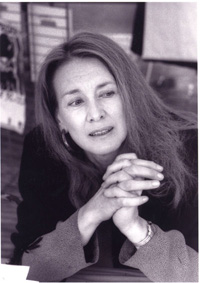
Annie Ernaux is one of the most popular contemporary French authors, whose books have been widely translated
into English. She was born in 1940 to a working class couple in the French village of Lillebonne. She grew up
as an only child; her parents' first daughter died of diphtheria before Ernaux was born. She was originally
trained as a teacher at the University of Rouen, and taught from 1977–2000 as a professor at the Centre
National d'Enseignement par Correspondance. She began to write novels, then focused her writing on biographical
works about herself and her parents, which include books about her childhood, adolescence, abortion, marriage,
and affairs. Her most acclaimed work is A Man's Place (La Place), which was awarded the Prix
Renaudot in 1984. Her latest book, Les Années, was published by Gallimard in 2008, and is
considered to be her "magnum opus".
Three of Ernaux's books will be reviewed here: A Man's Place, I Remain in Darkness, and The Possession.
A Man's Place [La Place] (1984)
A Man's Place is an autobiographical account of the life of Ernaux's father, Alphonse
Duchesne (1899–1967). He was an unremarkable man, with little to distinguish him from his peers in the French
countryside, or indeed from other men of his generation living in other countries. However, his life and
experiences, as told by Ernaux, bring that generation's customs, beliefs, prejudices, and desires to life.
Ernaux seeks to write an objective story about her father's life, through "selected facts and details". In doing so, she acknowledges that she does not tell us what her father meant to her, yet she prefers this technique, as "irony, pathos and nostalgia are something that I have already rejected". Her style in A Man's Place, as it is in her other books, is simple and direct, which translates effectively into English.
Alphonse Duchesne was born to a struggling family in a small village. Duchesne's father worked as a farmhand for a wealthy landowner, as he was too poor to own any land. A mean spirited and illiterate man, he would fly into a rage whenever he saw his wife or children reading for pleasure. His mother learned to read and write at a convent school, worked in a factory, and provided vitality and levity to her children. Duchesne attended school until the age of 12, when his father took him out of school to work on the landowner's farm; at that time, higher education was not meant for the working classes, and the Duchesnes needed Alphonse's labor to make ends meet.
Eventually Duchesne leaves his parents' home, serves his country at the end of the First World War, and marries Blanche, a woman from a similar background who is a co‒worker in a rope factory. The two pool their meager resources, and are able to buy a small grocery store in a nearby village. Their first child dies at a young age, and Annie is born a few years later. The family, like most other Europeans, suffers hardship during World War II, but eventually Duchesne and his wife purchase a small farmer's cottage, which they convert into a grocery store and café. He and Blanche work long hours, only closing the café only on Sunday afternoons, as they are barely able to meet their expenses and pay for Annie's schooling.
Ernaux chronicles her father's daily routines, work habits, leisure activities, and his quirks and mannerisms. Duchesne was friendly with customers and with beloved family and friends, but reserved with the white collar workers, land owners and other shopkeepers in town. His biggest fear was to embarrass himself in public, as he frequently struggled with his poor grammar and language. His motto and credo was "Better to be the head of a dog than the tail of a lion." He is a man of simple tastes, in keeping with his modest upbringing, which contrasts with his wife's eagerness to try new things, spout the newest popular phrases, and read about the latest styles in the Parisian magazines.
Alphonse is felled by a chronic gastrointestinal illness, and his remaining years are plagued by infirmity, as Blanche must take over the bulk of the day to day operations of the café. Despite his death, the café stays open, only closing only for a few hours on the day of his funeral, while the customers laud the late storeowner over a specially prepared dinner.
We learn that Ernaux is beloved by her father, as she discovers a newspaper clipping that mentions her second place finish in the entrance exam to the teacher's college that she attended years ago. Her views were shaped by him throughout childhood, but the two grew apart as she experienced life beyond small town France. The relationship becomes tense, as the two have little to discuss with each other, but their love and respect for each other does not wane.
Only at the end of the book does Ernaux allow her emotions and regrets to come out, which provides a melancholy but beautiful end to this ordinary yet remarkable account.
I Remain in Darkness (1997)
In contrast to A Man's Place, I Remain in Darkness, an account of the last years of the life
of Annie Ernaux's mother, Blanche, is a deeply personal and at times painful to read account. The book consists
of short notes that Ernaux took during her mother's decline and demise from Alzheimer's disease. Blanche
spent her last years in the geriatric ward of the local hospital, after Ernaux was unable to care for her
in her home. Annie visited her at least once a week, and upon returning home wrote short entries about these visits and her
mother's condition upon returning home. These entries were compiled, unchanged, in chronological order,
unchanged, to form this book. Ernaux mentions that the book is meant to represent "vestiges of pain", rather than an
objective chronicle of a person with end-stage Alzheimer's disease. The title of the book is the last
sentence that Blanche wrote before her death.
A major difference between these two accounts is that Ernaux was living with her family abroad during all but the last days of her father's life; during her mother's decline, which followed shortly after a serious automobile accident, she had separated from her husband and moved back to her home town with her children. Ernaux also tells us that she could not write a book about her mother as she did about her father in A Man's Place, as she is too identical to her mother to be able to write objectively about her.
In a typical vignette, Ernaux picks up her mother from a private home in an adjacent village, to bring her back "home". Blanche is crestfallen when she realizes that she will be going back to the same hospital where she had resided previously. Upon her arrival to the geriatric ward, Blanche is greeted by other women there, who view her as the "new girl", even though these women are the same ones that were there when Blanche originally left. As Ernaux leaves the ward, her mother calls to her longingly, and she realizes that the mother‒daughter relationship has turned 180 degrees: "The situation is reversed, now she is my little girl. I CANNOT be her mother."
Blanche's slow physical decline coincides with the loss of her mental capabilities, yet she is able to recognize her daughter and celebrate her frequent visits. Ultimately Blanche loses the ability to walk, dress and feed herself, as the disease process accelerates toward the end. Her lucid periods become less frequent and shorter in duration. As Blanche's life nears its end, Ernaux recalls happier memories, as she is not ready for her mother to leave her. She also compares her mother's decline to her own aging and progressive loss of her physical beauty, and fears that she will undergo the same fate. Her grief at the end of the book is almost too painful to read about, especially for this reader, whose parents are approaching their final years.
The Possession (2008)
This short novel is narrated by a divorced woman who has decided to end a long‒term affair with a
younger man, known only as W., due to a combination of boredom and a need to maintain her freedom, after
years of marriage. W. tells her that he will be moving out of his Parisian studio, to move in with a
woman who is unknown to her. She is devastated by this news, and soon becomes obsessed with W. and his
new lover: "This woman filled my head, my chest, and my gut; she was always with me, she took control
of my emotions. At the same time, her omnipresence gave my life a new intensity."
Her every waking moment is filled with a desire to learn more about this woman, and to get W. back by destroying this relationship. She has disturbing and savage fantasies about physically harming her rival, while realizing that this would not ease her suffering.
Eventually her torment becomes too great, and she tells W. that she doesn't want to see him anymore. The spell is broken after a six month long nightmare, and she is able to resume a normal life.
Although The Possession is a novel, it is so personal and raw and there is so much similarity between the lives of the narrator and the author that the reader can't help but assume that it is based on an actual affair that Ernaux had. This portrayal of jealousy and obsession is familiar yet disturbing in its intensity.
I find Ernaux to be one of the most important and essential writers of the human condition. Her memoirs about her childhood and her parents were compelling and insightful, even though their lives were not particularly unique or fascinating, and the raw emotions of the women in unrequited affairs in The Possession and Shame made me squirm in discomfort and empathy. I am eagerly awaiting the English translation of Les Années, her latest novel which has been widely praised in France and is considered to be her magnum opus.
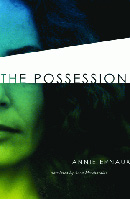
Seven Stories Press, paperback, 9781583220528
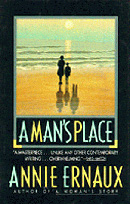
Seven Stories Press, paperback, 9780941423755
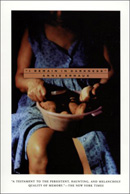
Seven Stories Press, paperback, 9781583220528
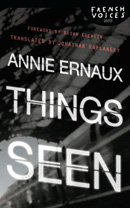
Univ. of Nebraska, paperback, 9780803228153 (March 2010)
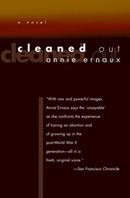
Dalkey Archive Press, paperback, 1564781399
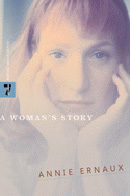
Seven Stories Press, paperback, 9781888363296
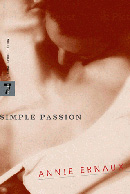
Seven Stories Press, paperback, 9781583225745
Additional Ernaux titles are available. See the Seven Stories Press website or your local book dealer